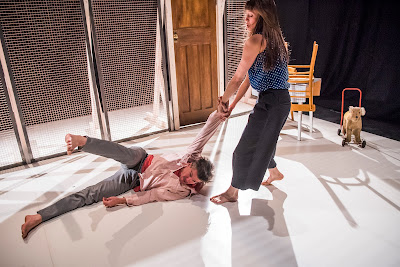Selene Weinachter and Kip Johnson as Juliet and Romeo in
Lost Dog's Juliet & Romeo directed by Ben Duke
Photo by Tristram Kenton
Juliet & Romeo.
Directed and
choreographed by Ben Duke. Performed by Solene Weinachter and Kip Johnson. Lost
Dog. Scott Theatre. Adelaide Festival. March 5-7 and 9-12 2022
Reviewed by Peter Wilkins
Juliet and Romeo have reached an
impasse in their marriage. After twenty years the cracks are beginning to
annoy, disappoint and frustrate. The flame that ignited their passion has now
dimmed and the star crossed lovers are contemplating separation. It is Juliet
who initiates the conversation, posing questions to Romeo whose monosyllabic
responses suggest an unwillingness to confront the awkward reality of their
marital problems. Juliet’s solution is to reenact the memories of their
relationship from the fancy dress party when their eyes locked across a crowded
room through the trials and tribulations of different expectations, the loss of
a child, the affair, parenthood and communication breakdown. Their journey
ingeniously parallels the trajectory of their namesakes’ deaths, a metaphorical
death when, in the final moment, Juliet is left alone as Romeo backs away
through the darkness.
 |
| Photo by Jane Hobson |
Lost Dog’s Artistic Director Ben Duke has constructed an intriguing scenario. Two chairs separated by a large indoor plant represent a marriage counsellor’s office where Juliet and Romeo face the reality of an imminent marriage breakdown. A series of vignettes construct a glimpse of the events leading up to the inescapable conclusion. Each vignette depicts a memory from either Romeo’s or Juliet’s perspective. Snippets of Shakespeare’s text permeate the dialogue, sketching the passage of love, parental objection, sexual passion and ill-fated destiny. This segues into dance, superbly intertwined physical theatre and a fusion of body and emotion. Each vignette is underscored by a familiar soundtrack, irrepressible passion accompanied by a stirring recording of music from Prokofiev’s composition for the ballet of Romeo and Juliet, or the soulful sound of Simon and Garfunkel’s Sound of Silence. There is resignation, an acceptance of the inevitable as body and limbs intertwine to Sinatra’s That’s Life and the inescapable consequence is reflected in the voice of Marvin Gaye as the audience watches the demise of hope and promise and the fading of romantic love. The joyful passion of unrestrained adulation and attraction appears unable to withstand the obstructions to Juliet and Romeo’s marriage.
I have difficulty with the
perception of a doomed relationship because Weinachter and Johnson share a very
special theatrical relationship together. Their dance is vital, physical and
highly expressive. Each moment is immaculately choreographed. Johnson’s
preening posturing as he approaches Juliet in a peacock display of masculine strutting
has an audience in hysterics as does the occasional exhibition of the art of
coarse acting. In an instant Weinachter and Johnson turn laughter to sombre
compassion as Juliet and Romeo confront
grief and loss. They watch in bewilderment as a foolish moment of lost control
can damage a marriage founded on love. Illusion is shattered in the portals of
life’s reality. The course of true love never did run smooth.
 |
| Photo by Jane Hobson |
Weinachter and Johnson work wonderfully together attuned to each other’s excellent sense of timing and versatile physicality. Duke directs with a fine eye for the moment, keeping the action moving and the audience utterly engaged. Only the death scenes though comical in Weinachter’s supine paortrayal of deaths instantaneousness could have been shorter. Also difficult to understand at times was Weinachter’s strong French accent. As charming as that might be, words were lost and with them the sense of occasion. Moments of anger flare and although the meaning is clear in gesture and voice, the words lose their clarity.
Juliet and Romeo is an ingenious
take on and use of Shakespeare’s plot and text, but it is the relationship
between two delightful performers on the stage and their physical interaction
to circumstance and feeling that makes Juliet and Romeo a refreshing, insightful
and imaginative theatre and dance experience. [i]
